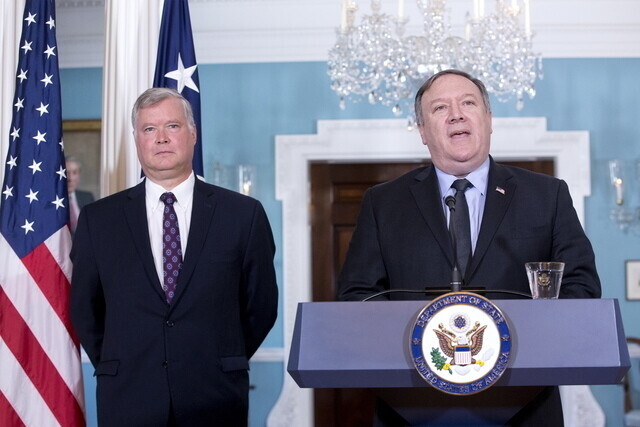hankyoreh
Links to other country sites 다른 나라 사이트 링크
[Editorial] N. Korea is willing to negotiate if US shifts from empty words to meaningful action

North Korean First Vice Minister of Foreign Affairs Choe Son-hui said in a statement on July 4 that the North does not “feel any need to sit face to face with the US, as it does not consider the DPRK [North Korea]-US dialogue as [anything] more than a tool for grappling [with] its political crisis.” Choe also doubted whether it is “possible to hold dialogue or have any dealings with the US which persists in the hostile policy toward the DPRK in disregard of the agreements already made at the past summit.”
Some analysts concluded that this statement rules out the possibility of a North Korea-US summit being held before the US presidential election, but that’s not the only way the statement can be read. A closer look shows that it stipulates the conditions for dialogue: the US must either start over from scratch or change its “hostile policy” toward North Korea. This suggests that North Korea is willing to sit down with the US if it shifts from empty words to meaningful action.
Choe’s statement was released shortly after South Korean President Moon Jae-in shuffled his foreign policy and national security teams and spoke about working to arrange a third North Korea-US summit and shortly before US Deputy Secretary of State Stephen Biegun was scheduled to visit South Korea (on July 7-9). As the US’ special representative for North Korea, Biegun is in charge of the US’s working-level denuclearization talks with the North, and he identified Choe as his counterpart in those talks last November. The message that Biegun sends to North Korea during his visit to the South will probably be vital to restarting North Korea-US dialogue.
The situation on the Korean Peninsula needs to be managed carefully to prevent it from deteriorating further, and a breakthrough must be found for the impasse in inter-Korean and North Korea-US dialogue. What the US needs to do first is take action that can determine its commitment to dialogue. One option worth considering is adjusting the ROK-US joint military exercises in August. North Korea has taken issue with those exercises, which it regards as part of the US’ policy of hostility toward the North. This year, both the US and South Korea have reportedly encountered numerous difficulties in preparing for the exercises because of the COVID-19 crisis. We hope the two governments will adjust these exercises to bring North Korea to the negotiating table and come up with creative proposals to break the ice on North Korea-US dialogue.
The South Korean government needs to work actively, and proactively, to improve inter-Korean relations and in so doing to create momentum for North Korea-US relations. By nominating Park Jie-won as director of the National Intelligence Service, Moon was basically saying that South Korea will speed up efforts to improve inter-Korean relations and asking the US to adopt a forward-looking attitude. It’s reportedly possible that Biegun will meet with the new foreign policy and national security lineup — including Park; Suh Hoon, director of the Blue House National Security Office; and Lee In-young, nominee for Unification Minister — during his visit to South Korea. We hope that the South Korean government will clearly convey its position to Biegun and make its case to the American government.
Please direct comments or questions to [english@hani.co.kr]

Editorial・opinion
![[Column] Season 2 of special prosecutor probe may be coming to Korea soon [Column] Season 2 of special prosecutor probe may be coming to Korea soon](https://flexible.img.hani.co.kr/flexible/normal/500/300/imgdb/original/2024/0426/3317141030699447.jpg) [Column] Season 2 of special prosecutor probe may be coming to Korea soon
[Column] Season 2 of special prosecutor probe may be coming to Korea soon![[Column] Park Geun-hye déjà vu in Yoon Suk-yeol [Column] Park Geun-hye déjà vu in Yoon Suk-yeol](https://flexible.img.hani.co.kr/flexible/normal/500/300/imgdb/original/2024/0424/651713945113788.jpg) [Column] Park Geun-hye déjà vu in Yoon Suk-yeol
[Column] Park Geun-hye déjà vu in Yoon Suk-yeol- [Editorial] New weight of N. Korea’s nuclear threats makes dialogue all the more urgent
- [Guest essay] The real reason Korea’s new right wants to dub Rhee a founding father
- [Column] ‘Choson’: Is it time we start referring to N. Korea in its own terms?
- [Editorial] Japan’s rewriting of history with Korea has gone too far
- [Column] The president’s questionable capacity for dialogue
- [Column] Are chaebol firms just pizza pies for families to divvy up as they please?
- [Column] Has Korea, too, crossed the Rubicon on China?
- [Correspondent’s column] In Japan’s alliance with US, echoes of its past alliances with UK
Most viewed articles
- 1Is Japan about to snatch control of Line messenger from Korea’s Naver?
- 2‘We must say no’: Seoul defense chief on Korean, USFK involvement in hypothetical Taiwan crisis
- 3[News analysis] Using lure of fame, K-entertainment agency bigwigs sexually prey on young trainees
- 4[Column] Park Geun-hye déjà vu in Yoon Suk-yeol
- 5Will NewJeans end up collateral damage in internal feud at K-pop juggernaut Hybe?
- 6Up-and-coming Indonesian group StarBe spills what it learned during K-pop training in Seoul
- 7[Column] Season 2 of special prosecutor probe may be coming to Korea soon
- 8Korea’s 1.3% growth in Q1 signals ‘textbook’ return to growth, says government
- 9Report reveals toxic pollution at numerous USFK bases
- 10[Editorial] Statue should not be central concern of comfort women issue